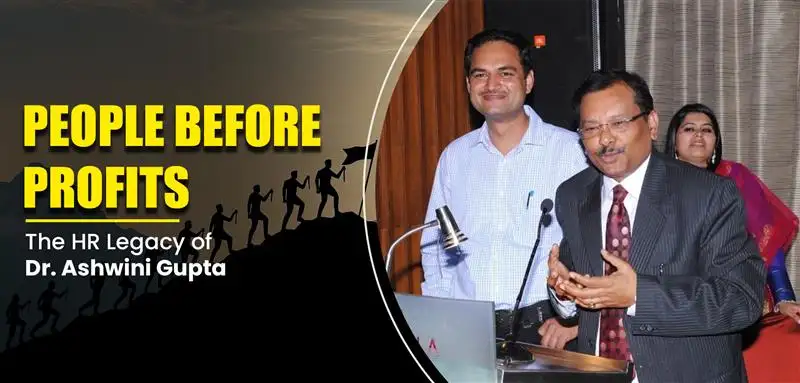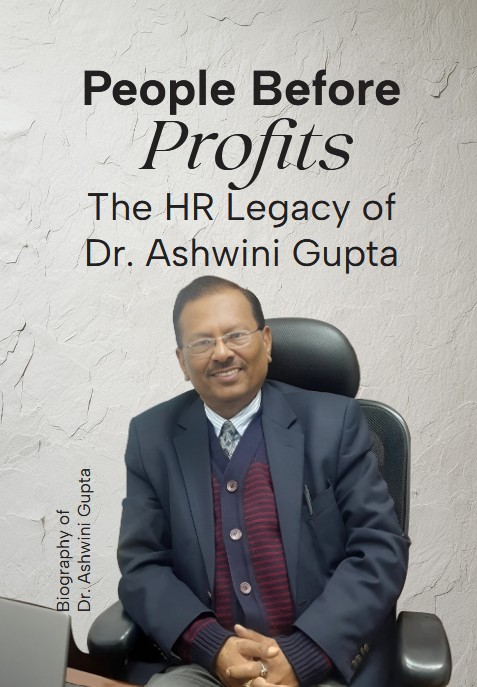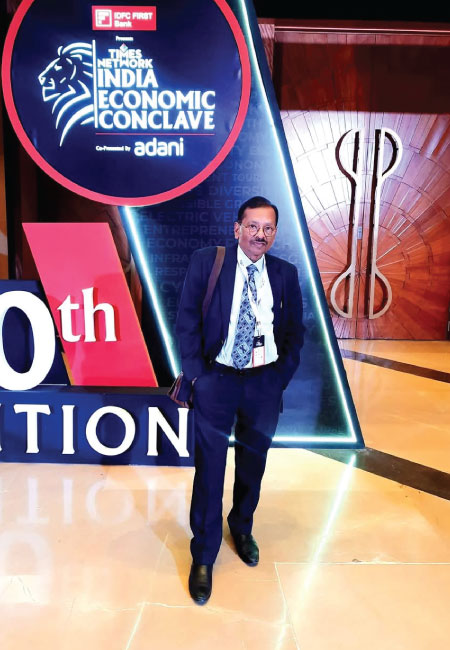

"LEADERSHIP is not about being in charge. It is about TAKING CARE of those in your charge"
Introduction
In the fast-paced, ever-evolving landscape of corporate India, where change is constant and challenges are many, there emerges, every once in a while, an individual whose quiet strength, unwavering principles, and human-centred leadership leave a lasting imprint — not just on organizations, but on people’s hearts. Dr. Ashwini Gupta is one such individual.
Born in 1957 in the modest town of Lalganj, District Azamgarh, in Uttar Pradesh, Dr. Gupta’s journey is a remarkable tale of perseverance, intellect, and empathy. A brilliant academic mind with degrees in Science, Law, and Human Resource Management, he chose to dedicate his life to the service of people within organizations — becoming a torchbearer of ethical leadership and transformative HR practices.
From his early beginnings at The Times of India Group to his influential role as Group Head-HR at ACB (India) Limited, his professional path was marked by tireless dedication, strategic foresight, and a rare ability to balance discipline with compassion. Across his nearly 40-year career, he shaped not just policies but cultures — fostering inclusive work environments, mentoring countless professionals, and upholding the dignity of every worker under his leadership.
Yet, this biography goes beyond roles and responsibilities. It captures the human behind the professional the values he held dear, the people who inspired him, the trials he overcame, and the legacy he continues to build. It brings to life a man whose influence is felt far beyond conference rooms and corporate seminars in the values he nurtured at home, the respect he earned in society, and the love he continues to receive from colleagues and family alike.
This book invites readers to witness the life story of a man who didn’t just build a career — he built people, trust, and institutions. A man who chose to lead not with authority, but with authenticity.
Phase 1 : Roots in
The journey of a thousand miles begins with a single step."

In the heartland of eastern Uttar Pradesh lies the modest town of Lalganj, part of the culturally rich and historically resonant district of Azamgarh. It was here, in the year 1957, that Dr. Ashwini Gupta took his first breath—a child born not into privilege, but into a world shaped by values, tradition, and community. Lalganj, with its winding dusty lanes, bustling markets, and verdant fields, offered not just a geographical setting but a formative canvas on which the earliest chapters of his life were painted.
From his earliest days, Dr. Ashwini exuded a quiet wisdom far beyond his years. In a time when childhood was often marked by simplicity and rural innocence, he stood apart not because of rebellion or noise, but because of his innate curiosity, empathy, and observation. Where other children might be content with play, Dr. Ashwini would often be found sitting beside elders, listening intently to their conversations about village affairs, family dilemmas, or societal dynamics. It wasn’t just talk for him it was insight. He absorbed the rhythms of human behaviour like a sponge, unknowingly preparing for a life in Human Resources decades before he would step into the corporate world.
The environment in which he was raised was one that emphasized hard work, discipline, and community values. His family, like many in Lalganj, upheld the principles of honesty, respect for elders, and commitment to education, even in the face of economic limitations. Dr. Ashwini, being a bright and sincere student, soon found himself excelling in school—not necessarily by rote, but by reflection. He questioned why people acted the way they did, how relationships were nurtured, and why leadership mattered even in small collectives like a classroom or family.
What truly set him apart, however, was his ability to understand people their motives, their pain, their aspirations. He didn’t just see human behaviour; he felt it, analysed it, and remembered it. This natural empathy, paired with his intellect, laid the foundation for what would later become a distinguished and impactful career in the field of Human Resources and Industrial Relations.
In Lalganj, life moved slowly, guided by the sun and seasons. Yet, within young Ashwini was a fire a deep desire to learn, grow, and reach beyond the familiar boundaries of his town. The quiet fields of Azamgarh whispered stories of ambition, and he listened. The scent of monsoon rain on the village earth, the rustle of neem trees in the evening wind, and the distant call to prayer from the local mosque and bell sound from local temple all of these became the soundtrack of a boy who would one day become a guiding force for thousands of professionals across India.
Phase 2 : A Scholar’s Journey from BHU
"Education is the most powerful weapon which you can use to change the world."

For Dr. Ashwini Gupta, education was never merely a means to secure a livelihood—it was a lifelong pursuit, a calling, and a sacred path to transformation. Coming from the rural yet intellectually vibrant environment of Lalganj, he recognized early on that education could be the bridge between limitations and possibilities, between humble origins, artistic nature and a meaningful life. Every book he opened, every lecture he attended, was a step toward that bridge.
His first major milestone came when he was admitted to the illustrious Banaras Hindu University (BHU), one of India’s premier institutions, revered for its academic excellence and cultural legacy. In the sprawling, spiritually charged campus of BHU, surrounded by the ancient wisdom of Varanasi, Dr. Ashwini found an environment that mirrored his inner hunger for knowledge. He pursued his Bachelor of Science in Biology, graduating in 1977. The study of life sciences not only honed his analytical thinking but deepened his appreciation for systems biological and beyond. The intricacies of biology taught him that everything in nature, including human behaviour and organizations, is interconnected and governed by patterns, something that would profoundly influence his approach in HR and industrial relations later.
But Dr. Ashwini was not one to be content with a single academic pursuit. His intellectual appetite was expansive curious about not only life sciences but also social justice, labor dynamics, and the frameworks that govern society. This curiosity led him to delve into legal studies, and by 1980, he had completed his Bachelor of Laws (LL.B.), with a specialization in Labour Laws and Taxation. This specialization would later become one of the cornerstones of his professional identity.
Through the study of law, he began to see not only how rights were protected and policies enforced but also how laws could be tools for fairness, negotiation, and organizational harmony. He admired the balance between justice and empathy—both values he held dearly.
In 1982, Dr. Ashwini’s formal legal journey began when he earned his Advocate Registration from the Bar Council of Uttar Pradesh. It was a momentous occasion—not just a certificate, but a validation of years of persistence, discipline, and intellectual rigor. This legal grounding equipped him with a rare dual lens: the precision of a scientist and the rationality of a lawyer. It gave him the ability to navigate complex human dynamics with logic, fairness, and strategic foresight.
Phase 3 : The Times of Transformation in Lucknow
"Success is not the key to happiness. Happiness is the key to success. If you love what you are doing, you will be successful."

As the pages of his academic chapter turned, Dr. Ashwini Gupta stepped into a world that would demand more than just qualifications—it would test his adaptability, conviction, and leadership. In 1983, he embarked on his professional journey with none other than The Times of India Group, one of the most prestigious and influential media conglomerates in the country. His role at the Lucknow edition placed him at the confluence of journalism, corporate dynamics, and human capital management—a fertile ground for growth, learning, and transformation.
The early 1980s were a time of dynamic change in India. The media landscape was evolving, labour relations were becoming more complex, and companies were beginning to understand the strategic importance of personnel management. For Dr. Ashwini, these challenges were not obstacles, but opportunities. As a Personnel Assistant, he quickly distinguished himself by his unwavering professionalism, attention to detail, and an innate ability to mediate and build trust among stakeholders.
The corporate corridors of the Times Group were filled with some of the sharpest minds—journalists, editors, administrators, and HR professionals. Among them, Dr. Ashwini stood out not only for his competence but for his deep empathy and solution-oriented approach. He wasn’t merely processing paperwork or enforcing policies; he was building bridges between people and purpose. His natural leadership qualities began to shine through as he took on greater responsibilities, balancing organizational goals with the needs of individuals.
By the end of 7.5 years, Dr. Ashwini had risen to the position of Senior Personnel Assistant, a testament to his diligence, emotional intelligence, and evolving managerial acumen.
He became a trusted figure within the organization—someone who could be relied upon to resolve disputes, interpret policy with fairness, and contribute meaningfully to both strategic discussions and day-to-day operations. More importantly, he developed a deep understanding of HR in a high-pressure, high-performance media environment, where timelines were tight, emotions ran high, and the stakes were always significant.
But for Dr. Ashwini, growth meant movement. In May 1991, he made a pivotal decision to join The Pioneer Ltd., another respected name in the Indian media landscape. This transition marked more than just a change of workplace; it marked the beginning of a phase where he would consolidate his experience, sharpen his leadership skills, and emerge as a dynamic HR strategist. At The Pioneer, he brought with him a wealth of insight and a unique blend of legal, managerial, and interpersonal strengths.